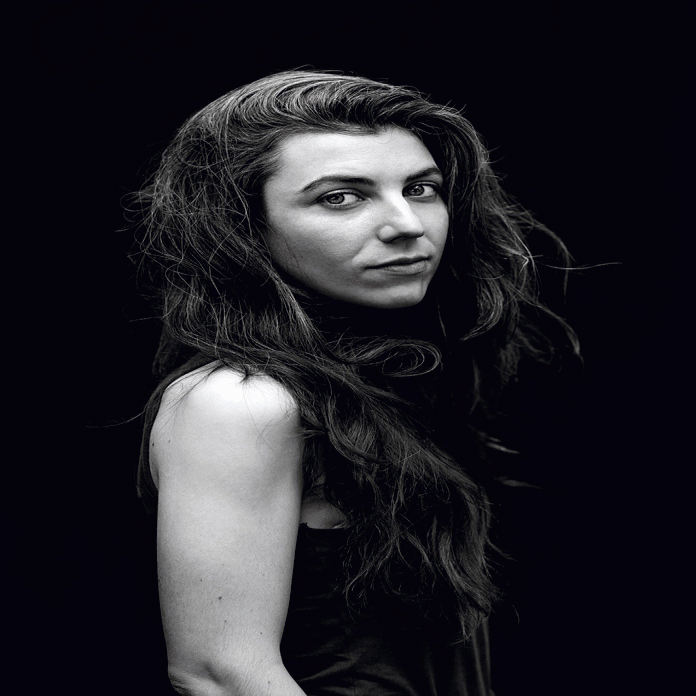
Julia Holter on “Aviary”
Lost in Her Own World
May 28, 2019
Photography by Ian Maddox
Issue #65 - Mitski and boygenius
![]()
It’s not just on record that Julia Holter demands your full attention. During her epic, and often extraordinary, new album Aviary, it is easy to feel lost and overwhelmed by its web of lush strings, abrupt transitions, and references from antiquity. Holter is a musician with two degrees in composition and the range of techniques used on Aviary may well draw from half of those syllabuses. In person, she can be just as confounding, as her answers jump from one idea to another, linked by a logic she can’t quite explain.

Take the album’s title for example. Holter can give a straight-forward answer—“what I was thinking of was likening it to the cacophony of the mind”—with the swirling chorus of birds representing a myriad of conflicting thoughts and emotions, but that answer belies its complexity.
One bird in Holter’s aviary is a quote from writer Etel Adnan’s Master of the Eclipse, which resonated with her out-of-context—“I found myself in an aviary full of shrieking birds.” Adnan’s collection of short stories is also important for another quote—“what are poets for in these destitute times?”—which informed her writing throughout the political turmoil of 2016 and 2017. “It seemed like a good question for me as I was trying figure it out,” she says. But other birds swirl around her album.
One is the opening scene of Andrei Tarkovsky’s Andrei Rublev, in which a man’s ecstatic experience of flying in a hot air balloon is undercut by an inevitable crash landing. Another is a theory from the Middle Ages where a birdcage was a symbol for a storage of memories. “The birds to me were like memories and it was like how memories can be very beautiful but also stalking like birds,” she explains. All of this could be crucial to untangling the messy web of influences and techniques on Aviary, but it could also mean nothing at all, as Holter stresses her music is an exercise in feeling over thought.

After the comparatively restrained Have You in My Wilderness, Holter decided to let sound guide her new album. The meandering structures of its songs are created from synth improvisations that were later arranged for musicians. And although the music is more challenging, it is a more natural process to her. “I always tend to have an interest in pulling together lots of different texts and building form out of sound,” she says. “Have You in My Wilderness was really a challenge for me to try something different.”
On Aviary, that interest returns in full, with references to Alexander Pushkin, troubadour Bernart de Ventadorn, and Buddhist musician Choying Drolma to name a few. After a period of writer’s block, informed partly by the surrounding political tension, Holter found a new interest in exploring texture and unusual structures. “When I started making this record, I didn’t know what to make,” she admits. “I had zero ideas, it almost felt wrong for me to make music at that time. I didn’t know what I was doing, and I felt overwhelmed by everything.” Her solution was to link the songs on Aviary sonically, rather than thematically, with gliding synths and strings creating a world she jokes is “a little bit medieval and a little bit Blade Runner.”

The aural landscape of Aviary is mesmerizing, evoking the experience of being lost in a dense forest, separated from the rest of the world. But, why, in the face of mounting political anger and frustration, did Holter decide to dive into a world of fantasy and distant history? Why did she not choose to confront today’s demons? And why did she not choose to make an overtly political album?
“Did I say it was not a political record?” she responds—and to her credit, she didn’t. But, in the age of Pussy Riot, March of Our Lives, and NFL protests, do songs based on the poetry of Sappho really cut it? “Well I think all art is political in a way. That was something I didn’t think about in the past and I think that was just naive of me,” she says. “I was a little bit in a bubble thinking my work wasn’t political—and I think that’s a bit entitled or something. I don’t have to say it’s a political record.”

But it is true there is no clear answer for what exactly Holter is trying to say on this album and interpretation is left almost entirely with the listener. “I don’t think of lyrics in music as poetry,” Holter says. “It’s not a form of communication to me, it’s something different. It’s a physical thing that hits you but it’s interpreted differently by each receiver.” The politics of Aviary may be found in its openness, its compassion, and its desire to embrace love over anger, but Holter is not keen to stress any one interpretation.
That is why she is reluctant to draw attention to the wealth of historical references on Aviary and attempts to downplay the intellectual qualities of the album. “I don’t want to emphasize it to listeners,” she says. “For journalists writing about it, I’m happy to talk so it’s clear I’ve thought about these things but as a listener, I hope it’s not like you have to stop and look at the footnote.”

You don’t need any knowledge of antiquity, or experimental literature, or musical theory to connect with Holter’s music and although Aviary is challenging, it is not a chore to listen to. In fact, it is a richly rewarding album filled with surprisingly beautiful moments. And if you can find a quiet space away from distractions, you may be left spellbound by the cacophonous opening of “Turn the Lights On,” or the shape-shifting grooves of “Underneath the Moon,” or the album’s stirring centerpiece “I Shall Love 2.”
Holter is not a stuffy art-school graduate desperate to impress listeners with her knowledge. In person, she is warm, unassuming, and slightly embarrassed by her reputation as a “difficult” musician. But Aviary is undoubtedly a “difficult” album by popular music standards and her critics will argue it is a little too clever for its own good. What exactly stops Aviary from being a pretentious record?

When I ask Holter this question, she laughs, perhaps because she still hasn’t quite worked out the answer. “It is true when you list all of those [influences] on a piece of paper it can totally come off as pretentious,” she admits. “But I think sometimes you can make a choice to mention things or…. I wonder ‘do a lot of people write this way and not mention it?’ because this is just how I write.” Nevertheless, it’s hard to imagine she’ll share a record-shelf with many artists well-versed in the work of Sappho. “I don’t know what to say about it, this is how I make music,” she says. “I feel like I can’t be alone in that.”
[Note: This article originally appeared in Issue 65 of Under the Radar’s print magazine, which is out now. This is its debut online.]
Support Under the Radar on Patreon.
Current Issue

Issue #72
Apr 19, 2024 Issue #72 - The ‘90s Issue with The Cardigans and Thurston Moore
Most Recent
- Crumb Share Video for New Song “The Bug” and Announce New Tour Dates (News) — Crumb
- Sam Evian on “Plunge” (Interview) — Sam Evian
- Maya Hawke Shares Lyric Video for New Song “Hang in There” (News) — Maya Hawke
- Premiere: Anna Tivel Shares New Single “Desperation” (News) — Anna Tivel
- Nilüfer Yanya is a Runaway Bride in the Video for New Song “Like I Say (I runaway)” (News) — Nilüfer Yanya

Comments
Submit your comment
June 4th 2019
6:39am
I like this site very much. This is an amazing site for entertainment. They provide news, articles, interviews, previews, etc about books, film and music industries. It updates regularly and the contents are so good. This article on Aviary of Julia Holter is great.